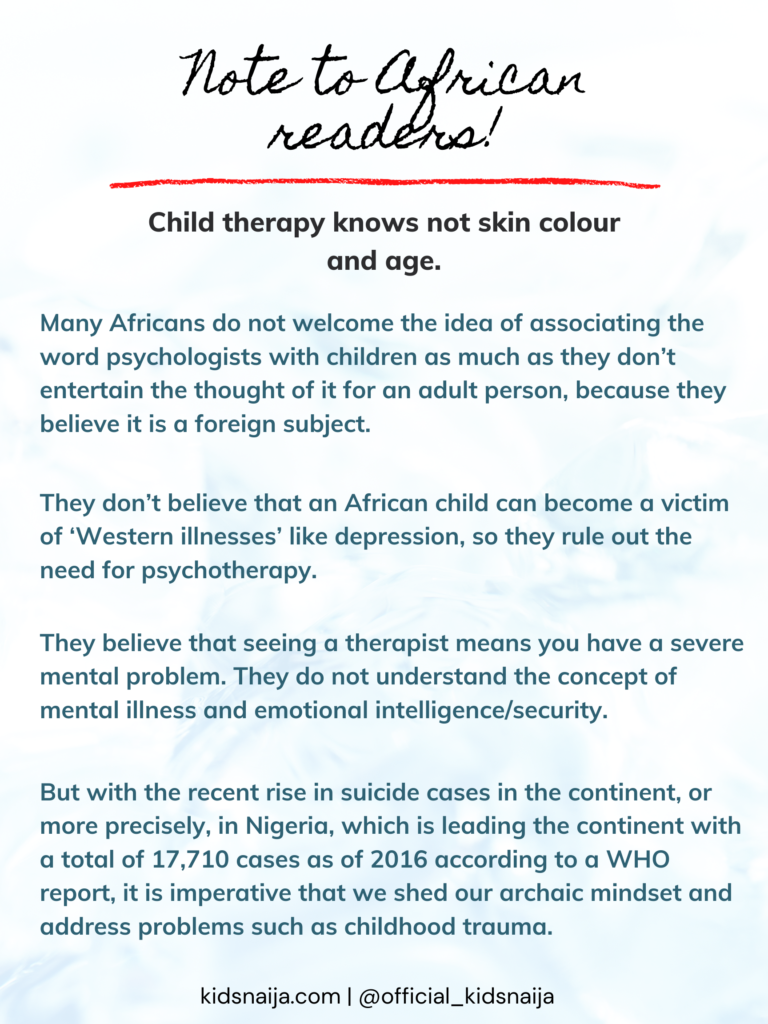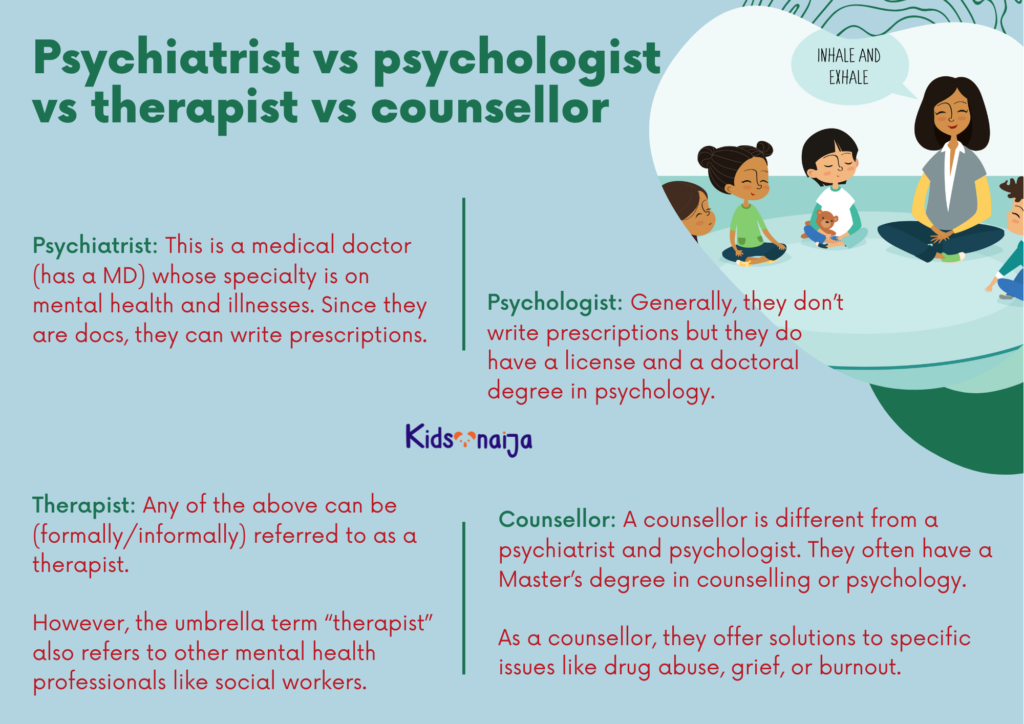Does my child need therapy?
No parent hopes to get a yes to that question but sadly, children do need therapy. And if you’re asking the question, chances are you have a gut feeling about your child needing one. Thankfully, it’s okay and normal for young children and adolescents to have therapists.
But does a child have to be traumatized to see a therapist? Is counselling by a third party healthy for children? This article will help you answer these questions alongside the ultimate question – does my child need therapy?
Children experience various things as they grow and most of these things are beyond their control. Some children might not be able to share these experiences with their parents or guardian. Hence, why they need experts to help them through difficult times.
PS: The terms, therapist, psychologists, and counsellors are used synonymously throughout this article.

What is child therapy?
Child therapy (or child counselling) is a branch of psychotherapy that utilizes diverse methods to help children. It helps them to deal with behavioural, mental, or emotional problems.
It’s a well-structured approach aimed at helping children cope with life.
Most people who question the need for child psychologists often have a narrow view of the word ‘psychology’. They reduce the need of therapy to just mental illness like bipolar disorder. But that is contrary to the case, therapy isn’t needed for only children diagnosed with a mental illness.
A child does not need to be diagnosed with a mental illness like anxiety disorder before seeing a therapist. Child therapy is also important to help children work through difficult or traumatic events like the death of a loved one, a life-threatening ailment, and parental divorce.
Who is a child therapist?
A child therapist is a trained psychologist that employs psychotherapeutic tools in helping children who are struggling with various mental, emotional, social, and behavioural problems.
A child therapist performs slightly different jobs than child psychologists and counsellors that offer short term therapy. Child therapists are result-oriented mental health professionals that work closely with children. They instil positive attributes and also introduce the child to healthier mental practices or coping techniques.
In all, they’re patient, sensitive, and empathetic experts who are trained to connect with children. And in this process, therapists help them manage and overcome various difficulties.

Types of child therapy
There are several types of child therapy, which are grouped according to their method in treating certain mental illness.
Below, is a list of the types of therapy for children according to the American Academy of Child and Adolescent Psychiatry (AACAP).
1. Acceptance and Commitment Therapy (ACT)
ACT is a form of psychotherapeutic treatment that focuses on helping children accept their feelings and thoughts by overcoming fear and anxiety. It’s a form of pain-acceptance therapy that encourages children to embrace their scariest emotions.
Though used to treat anxiety and depression, it also helps children deal with medical illnesses like cancer.
2. Cognitive Behaviour Therapy (CBT)
This type of child therapy aims to identify and correct or eliminate emotions, thoughts, feelings, or behaviours that could negatively affect a child and replace them with positive ones.
It teaches children to redirect their minds from the negative parts of life beyond their control to the good things that make them happy.
CBT is used to treat a number of mental and emotional conditions like depression, anxiety, panic attack, conduct disorders, mood disorder, eating disorder, etc.
3. Play Therapy:

This type of child counselling exploits a child’s inherent playfulness to identify and meet their mental and emotional needs.
It’s handy when a child finds it difficult to voice their thoughts or express their feelings.
4. Parent-Child Interaction Therapy (PCIT)
This therapy helps parents build a rapport with their children in order to effectively train and guide them.
This therapy helps a parent understand, communicate, and train a child who exhibits disruptive behaviours like restlessness and high temperament.
It helps a child who habitually defies adult requests, is easily frustrated, destroys properties, and suffer from emotional dysfunction.
5. Dialectical Behaviour Therapy (DBT)
This form of therapy is hinged on the meaning of the word dialectical: acting through opposing forces. It’s a form of cognitive behaviour therapy that teaches children, not just to accept, but to effect a change in their behaviour through all the opposing forces in their minds.
Dialectical behaviour therapy is used to treat children with borderline personality disorder (BPD), suicidal behaviours, and other mental health conditions.
6. Psychodynamic Psychotherapy
This form of in-depth psychology focuses on the foundational cause of a child’s emotional problems. It helps to improve a child’s emotional wellbeing through self-reflection.
7. Supportive Therapy
This a type of child therapy that empathizes with a child’s emotional challenges by encouraging and supporting them. It gives room for children to express their inner feelings in order to get better.
Other effective forms of therapy include occupational therapy, family therapy, and group therapy.
At what age can a child visit a psychologist?
A single person study carried out on a 3-year-old girl proves that paediatric psychologists can work with toddlers, too. The researchers reported that the girl’s play and speech communication improved after her psychotherapy sessions.
This means that children as young as 3 years old can see a child counsellor.
Does my child need therapy?
To ensure your child’s emotional, mental, social, and physical well-being, yes, your child needs to see a psychologist. Needing therapy doesn’t mean you’ve failed as a parent – everyone needs therapy at some point.
Psychotherapy is not gender or age-based. It’s an approach that improves the overall wellbeing of your child. If you can’t shake the thought that your child needs therapy, it might be a good idea to talk to a therapist.
While at it, don’t forget to talk to your child as well. Try to find out if something is up and what it can be.
Some common signs that your needs therapy includes:
- The distorted idea of their body image
- Frequent mood swings
- Has an unhealthy relationship with food
- Memory and learning difficulties
- Sudden isolation from friends and family
- Not getting enough sleep or getting too much
- Strange interest in talking about death
- Hyperactivity and destructive behaviours
Reasons to see a child therapist
Your child (might) need counselling to get through tough situations like:
- Sexual abuse
- Substance abuse
- Grief due to the death of a loved one (pets included!)
- Suicide ideations
- Bullying in school (and anywhere else)
- Parental divorce
- Adjusting into a new home, school, or a new environment
- Witness to a traumatic event such as kidnapping
- Mental illnesses like eating disorder or depression
How to get your child to see a therapist
A child might not understand the importance of visiting a therapist. Hence, they might be reluctant to subject themselves to the process. In this case, it now falls on you to explain the motive behind the exercise.
Children are naturally in love with fun, so you might want to ensure that their therapist is endearing enough to entertain their fun-loving nature. Else, you’ll have issues getting your child to continue therapy.
Benefits of children counselling
- Counselling helps children understand the things that seem too complex for them.
- It uproots positive behaviours that the child might not have been able to produce on their own.
- Counselling boosts their confidence and self-esteem through the positivity it instills in children.
- It improves their communication skills and makes them more expressive of their feelings.
- It builds optimism in children by encouraging them to redirect their focus from negativity to the good things around them that brings them joy.
- Child therapy helps to prevent rash actions like suicidal conditions by tackling depression and other mental disorders that cause it.
- It helps children accept tough situations while proffering an escape route, or ignoring it if it’s beyond their control.
- Child therapy helps children to develop control over their emotions.
- Parent-child interaction therapy helps to build a good relationship between parents and their children.
- Proper guidance and counselling from trained experts help to tackle mild mental challenges in children that could’ve degenerated into serious issues for them in the future.
Final words
So, does your child need therapy?
Any child can also tap from the immense benefits of child counselling. Remember, mental illnesses and emotional traumas do not know skin colour nor age.

